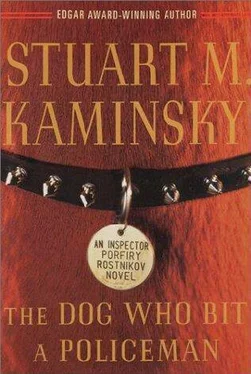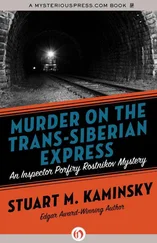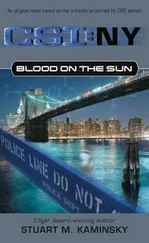Stuart Kaminsky - The Dog Who Bit a Policeman
Здесь есть возможность читать онлайн «Stuart Kaminsky - The Dog Who Bit a Policeman» весь текст электронной книги совершенно бесплатно (целиком полную версию без сокращений). В некоторых случаях можно слушать аудио, скачать через торрент в формате fb2 и присутствует краткое содержание. Жанр: Полицейский детектив, на русском языке. Описание произведения, (предисловие) а так же отзывы посетителей доступны на портале библиотеки ЛибКат.
- Название:The Dog Who Bit a Policeman
- Автор:
- Жанр:
- Год:неизвестен
- ISBN:нет данных
- Рейтинг книги:3 / 5. Голосов: 1
-
Избранное:Добавить в избранное
- Отзывы:
-
Ваша оценка:
- 60
- 1
- 2
- 3
- 4
- 5
The Dog Who Bit a Policeman: краткое содержание, описание и аннотация
Предлагаем к чтению аннотацию, описание, краткое содержание или предисловие (зависит от того, что написал сам автор книги «The Dog Who Bit a Policeman»). Если вы не нашли необходимую информацию о книге — напишите в комментариях, мы постараемся отыскать её.
The Dog Who Bit a Policeman — читать онлайн бесплатно полную книгу (весь текст) целиком
Ниже представлен текст книги, разбитый по страницам. Система сохранения места последней прочитанной страницы, позволяет с удобством читать онлайн бесплатно книгу «The Dog Who Bit a Policeman», без необходимости каждый раз заново искать на чём Вы остановились. Поставьте закладку, и сможете в любой момент перейти на страницу, на которой закончили чтение.
Интервал:
Закладка:
But that was long ago. Times had changed. The bureaucracy was different. Things were worse.
Chenko, the one-eyed Tatar, was the first to arrive. The young man who had met Rostnikov before his first encounter with Chenko came out of a car illegally parked at the curb. The windows of the car were tinted. The young man looked both ways and around the street. Then he looked through the window, saw Rostnikov, and returned to open the back door of the parked car. A moment later Chenko came out of the car and quickly entered the door of the restaurant, which the young man helped open for him.
The man stood outside the door, his back to the restaurant, and Chenko moved forward to the table.
“What is this?” said the Tatar.
“A tomato sandwich,” said Rostnikov.
“I don’t like jokes,” said Chenko, cocking his head from side to side to look at the two men.
“Neither does my associate,” Rostnikov said, nodding at Karpo.
“Please sit.”
“If this is a trap,” Chenko said, “my men have been ordered to kill both of you very painfully and then to do the same to all the members of your families till your line is erased.”
“That,” said Rostnikov, “is very colorful. The Godfather, something like that. I believe you, Casmir Chenko. Your problem is that if we were to be killed, our friends would destroy your families. We could start a regular old-style feud with our descendants killing each other, forgetting eventually why they were doing so. This is not a trap. Please sit.”
The gnarled, one-eyed man sat at the table with his back to the side wall. He was between the two policemen.
“Mineral water? Something to eat?”
“Nothing,” said Chenko. “I will remain here for five minutes, no longer.”
At this point, Cashierovsky appeared with a large, round metal tray covered with small plates of food- ukha, fish soup; meat boiled in kvass and served with kasha . He placed the plates and forks out for the men, and, after putting the empty tray on the counter, the shopkeeper moved to stand next to the front door of his establishment, as Rostnikov had asked him.
Rostnikov’s eyes moved to the door as did Chenko’s single eye.
Karpo did not turn. He finished the last piece of his roll and served himself a plate of kasha . Rostnikov ate with one hand, the other in his lap within easy reach of the weapon under his jacket.
Chenko started to rise. “I will not talk to him,” he said.
“You don’t have to,” said Rostnikov. “I would like you to simply listen to me. Sit, please.”
Rostnikov knew that Chenko’s gesture had been for show. In his call asking the Tatar to meet here, he had been clear that Shatalov would also be present.
Outside the door Shatalov posted his own man, who stood facing Chenko’s young man. There was certainly a carful of Chechins close by.
Shatalov moved to the table. His smile was gone. He did not look at Chenko. “There is no point to this,” said Shatalov. “It is too late for talk. I agreed to a truce and he. . that smirking Tatar murdered one of my best men.”
“You are here, sit,” said Rostnikov. “Casmir Chenko did not murder your man as you had not murdered his man.”
“I. .”
“You will please sit,” said Rostnikov loudly, bringing a fist down on the table that made the two men outside the restaurant and Peto Cashierovsky start nervously.
Shatalov sat and motioned to his man outside that everything was calm. Chenko did the same.
“I now know you have a temper, policeman,” said Shatalov, “and terrible taste in clothes.”
“My anger comes unbidden. As for the clothes, I had an accident,” said Rostnikov.
“Others can be arranged,” said Shatalov, looking at Chenko for the first time.
“Easily,” said Chenko.
“One-eyed, wattle-necked rooster,” said Shatalov, whose white hair looked even whiter than it had the day before.
“Irving,” said Chenko.
“Do you want to know who killed your men and why, or do you want to simply leave here ignorant and continue the war that is costing you lives and rubles?” asked Rostnikov.
“Why do you care?” asked Chenko.
“Innocent people will die,” said Rostnikov. “I don’t care about you or your men. Innocent people have already died because of you.”
Rostnikov picked up the newspaper article which he had placed facedown on the table. He handed it first to Chenko, who cocked his head to one side to read it with his good eye. When Chenko was finished, he handed it back to Rostnikov, who handed it to Shatalov, who read it quickly and returned it to the policeman.
“The name of the boy who died when your men had a street fight, a fight over an insult, not even over territory, a fight. . the name means nothing to you, either of you? The underlined name?”
“Nothing,” said Chenko.
“Nothing,” said Shatalov.
“Emil, tell them the name of the killer of their men.”
Karpo did as he was told.
“I don’t know this person,” said Shatalov.
“I don’t either,” said Chenko.
“Yes, you do,” said Rostnikov. “I will tell you and convince you, and you will stop your war before it begins. I have no illusions. At some time, you will start killing each other again, and though it may make no difference to either of you, if one more innocent person dies, I will see to it that you are both brought to justice. This I promise you and myself.”
“Talk,” said Shatalov, looking at his watch. “I told my men I would be in here no more than ten minutes.”
“I told my men five minutes,” said Chenko. “And those minutes are almost up.”
And so Porfiry Petrovich Rostnikov pushed his plate away and explained. They listened. There was not much to tell. When he was done, Chenko rose immediately.
“You are both convinced?” asked Rostnikov.
Neither man spoke. Both nodded that they were convinced.
“There is a condition to my telling you this truth,” Rostnikov went on, pulling the plate of food back so he could reach it. “You are not to seek out or harm the one who did this.”
“That cannot be,” said Chenko.
“It cannot,” said Shatalov.
“An eye for an eye. Five gangsters for one child,” said Rostnikov, his hand still in his lap. “I want your word.”
“You will accept our word?” asked Shatalov.
“Yes,” said Rostnikov.
“No more killings?” said Shatalov, looking at Chenko.
“Not from the person I have just named,” said Rostnikov.
“You have my word,” said Chenko.
“You have mine,” said Shatalov.
“I arrived first,” said Chenko. “I leave first.”
Shatalov opened his mouth to speak, but Rostnikov stopped him. “Go,” Porfiry Petrovich said, and the one-eyed man left.
When he had entered the car with tinted windows, followed by the young man he had posted at the door, Rostnikov nodded at Shatalov that he could leave. The white-haired gangster rose and departed. Rostnikov eased his weapon into the pocket of the ugly slacks of Leon’s dead father-in-law.
When Shatalov was no longer visible outside the door, Rostnikov said thank you to Peto, who took down the “closed” sign, hurried to the table, and asked no questions about what had just happened in his restaurant, though he was pulsing with curiosity.
“Another tomato sandwich?” asked Cashierovsky.
“Why not? Another roll and tea for you, Emil Karpo?”
Karpo shook his head.
“I’ll wrap the food you didn’t eat to take home,” said the restaurant owner.
“That would be very nice,” said Rostnikov.
The pudgy restaurant owner hurried off to make another sandwich for Rostnikov.
“Were you genuinely angry when you struck the table, Porfiry Petrovich?” asked Karpo. “It was very unlike you, but most effective.”
Читать дальшеИнтервал:
Закладка:
Похожие книги на «The Dog Who Bit a Policeman»
Представляем Вашему вниманию похожие книги на «The Dog Who Bit a Policeman» списком для выбора. Мы отобрали схожую по названию и смыслу литературу в надежде предоставить читателям больше вариантов отыскать новые, интересные, ещё непрочитанные произведения.
Обсуждение, отзывы о книге «The Dog Who Bit a Policeman» и просто собственные мнения читателей. Оставьте ваши комментарии, напишите, что Вы думаете о произведении, его смысле или главных героях. Укажите что конкретно понравилось, а что нет, и почему Вы так считаете.












